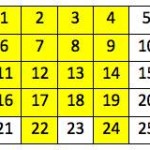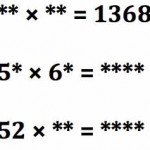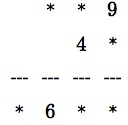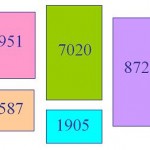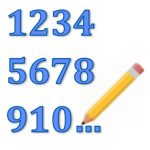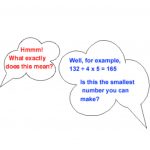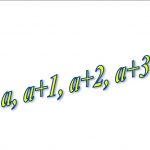Choose your number to start and shade it on the grid.
To go to another number you can either MULTIPLY BY 2 or SUBTRACT 5.
So if you start on 12, you can either shade 12 x 2 = 24 or 12 – 5 = 7
Choose any shaded number and carry on until […]
Which of the following products are close to 1368:
20 x 40 20 x 50 20 x 70
40 x 50 40 x 70 or 50 x 70?
In these three multiplication sums, using the digits 1 to 8 once and only […]
(1) Some 4 digit numbers can be written as the product of a 3 digit number and a 2 digit number using the digits 1 to 9 each once and only once.
Can you use the digits 1 to 9 once, but only once, to replace the stars and complete the multiplication * *9 […]
Can you use the digits 1, 2, 3, 4, 5 and 6, each only once, to make a number which is divisible by 6
… so that when the final or last digit is removed it becomes a 5-digit number divisible by 5, and when the last digit is removed from that number […]
Write down three consecutive whole numbers none of which is a multiple of three. If you can’t do it, explain why.
Multiply any two consecutive even numbers together. Why is the product always a multiple of eight?
Take any prime number greater than 3, square it, subtract one and divide by 24.
Make a […]
What is the largest number that, when divided into each of 1905, 2587, 3951, 7020 and 8725, leaves the same remainder each time?
When a problem seems difficult a good strategy is to try a simple case.
The diagram should help you to find the answer to the same question […]
Suppose you had the never ending task of writing out all the natural numbers: 1, 2, 3, 4, 5…. and so on.
What would be the 1000th digit you would write down?
In what number would it occur?
What number would contain the millionth digit?
When would you have written six for […]
Using the numbers 1, 2, 3, 4 and 5 once and only once and the symbols × and ÷ once and only once, what is the smallest whole number you can make?
Now suppose you have to use the symbol + once and the symbol ÷ twice what is the smallest fraction […]
Choose four consecutive whole numbers, for example, 4, 5, 6 and 7.
Multiply the first and last numbers together (28).
Multiply the middle pair together (30).
Choose different sets of four consecutive whole numbers and do the same.
What do you notice about the difference between the two […]
South Africa COVID-19 News
Here is the official website for COVID-19 updates.
Login
SUPPORT AIMSSEC

